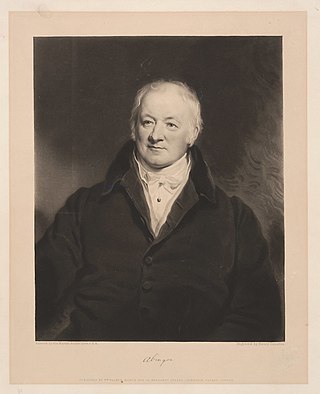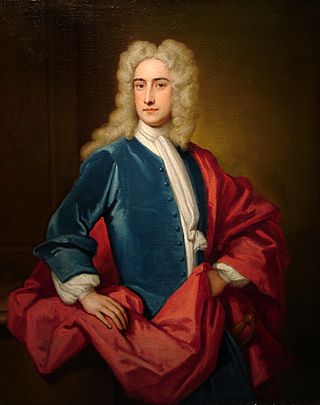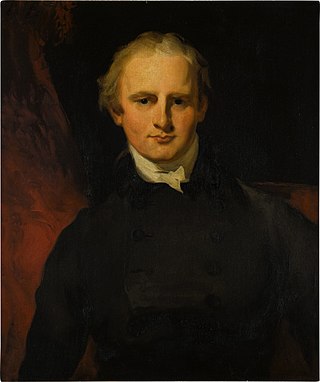
James Scarlett, 1st Baron Abinger, was an English lawyer, politician and judge.

Sir James Mackintosh FRS FRSE was a Scottish jurist, Whig politician and Whig historian. His studies and sympathies embraced many interests. He was trained as a doctor and barrister, and worked also as a journalist, judge, administrator, professor, philosopher and politician.

Samuel Rogers was an English poet, during his lifetime one of the most celebrated, although his fame has long since been eclipsed by his Romantic colleagues and friends Wordsworth, Coleridge and Byron. His recollections of these and other friends such as Charles James Fox are key sources for information about London artistic and literary life, with which he was intimate, and which he used his wealth to support. He made his money as a banker and was also a discriminating art collector.

Francis Jeffrey, Lord Jeffrey was a Scottish judge and literary critic.

The Rye House Plot of 1683 was a plan to assassinate King Charles II of England and his brother James, Duke of York. The royal party went from Westminster to Newmarket to see horse races and were expected to make the return journey on 1 April 1683, but because there was a major fire in Newmarket on 22 March, the races were cancelled, and the King and the Duke returned to London early. As a result, the planned attack never took place.

John Romilly, 1st Baron Romilly PC, known as Sir John Romilly between 1848 and 1866, was an English Whig politician and judge. He served in Lord John Russell's first administration as Solicitor-General from 1848 to 1850 and as Attorney-General from 1850 and 1851. The latter year he was appointed Master of the Rolls, a post he held until 1873. Knighted in 1848, he was ennobled as Baron Romilly in 1866.

Sir Samuel Romilly, was a British lawyer, politician and legal reformer. From a background in the commercial world, he became well-connected, and rose to public office and a prominent position in Parliament. After an early interest in radical politics, he built a career in chancery cases, and then turned to amelioration of the British criminal law.

Samuel Sandys, 1st Baron Sandys, was a British Whig politician who represented Worcester in the House of Commons from 1718 until 1743, when he was created Baron Sandys. He held numerous posts in the government of the United Kingdom, namely Chancellor of the Exchequer, Leader of the House of Commons, Cofferer of the Household and First Lord of Trade. He was also a justice in eyre.

Clan Carnegie is a Lowland Scottish clan.

The Club or Literary Club is a London dining club founded in February 1764 by the artist Joshua Reynolds and essayist Samuel Johnson.
Richard Sharp, FRS, FSA, also known as "Conversation" Sharp, was an English hat-maker, banker, merchant, poet, critic, Member of Parliament, and conversationalist. He was at various times known in London society as "Hatter Sharp", "Furrier Sharp", "Copenhagen Sharp", or most famously of all as "Conversation Sharp".

Robert Percy Smith, known as "Bobus" Smith, was a British lawyer, Member of Parliament, and Judge Advocate-General of Bengal, India.

The Honourable Douglas James William Kinnaird was an English banker, politician, friend of Lord Byron and amateur cricketer. He was a Managing Partner in the banking firm of Ransom & Co. He also briefly served as Member of Parliament for Bishop's Castle from 1819 to 1820.
Sir George Philips, 1st Baronet was an English textile industrialist and politician. He was closely associated with Manchesterism and has been described as the "unofficial member for Manchester", though not formally representing it.

General Richard FitzPatrick, styled The Honourable from birth, was an Anglo-Irish soldier, wit, poet, and Whig politician. He sat in the British House of Commons for 39 years from 1774 to 1813 and was a "sworn brother" of the statesman Charles James Fox. He served in the Philadelphia campaign during the American Revolutionary War.
Maria Kinnaird (1810–1891), born on St. Vincent, was orphaned when La Soufrière erupted in 1812 and was later adopted by the politician Richard Sharp, known as "Conversation Sharp". Sharp was once considered possibly to be the most popular man in London of his time. Through her adoptive father, she inherited not only a considerable fortune but a wide network of influential friends and contacts, particularly among Whig circles. She became a prominent socialite and leading hostess in London during the mid-Victorian period and was described as being an accomplished, attractive, and intelligent woman. In 1835, she married Thomas Drummond, who developed the use of Drummond Light in surveying. She would be her husband's mainstay during his final years as Under-Secretary for Ireland (1835–1840).

Edward Harbord, 3rd Baron Suffield, styled The Honourable Edward Harbord between 1786 and 1821, was a British liberal politician, anti-slavery campaigner and prison reformer.
John Whishaw was an English lawyer. He became a Commissioner of Audit, and a leader of Whig society, known as "the Pope of Holland House".

Peter Moore (1753–1828) was an English civil servant of the East India Company and politician.
The British Association for the Relief of Distress in Ireland and the Highlands of Scotland, known as the British Relief Association (BRA), was a private charity of the mid-19th century in the United Kingdom of Great Britain and Ireland. Established by a group of prominent aristocrats, bankers and philanthropists in 1847, the charity was the largest private provider of relief during the Great Irish Famine and Highland Potato Famine of the 1840s. During its brief period of operation, the Association received donations and support from many notable politicians and royalty, including Queen Victoria.















